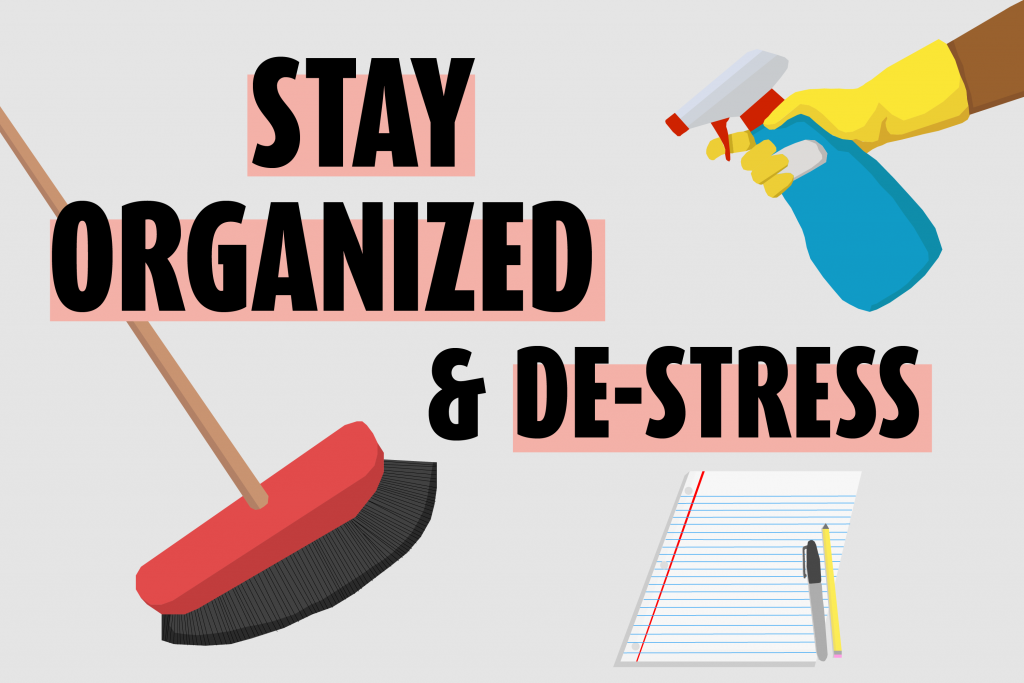National Cleaning Week emphasizes health benefits of organized living
National Cleaning Week promotes clean, healthy lifestyle

Between classes, studying and extracurricular activities, keeping a clean and organized room may fall by the wayside for many college students.
With National Cleaning Week beginning March 28, it’s important for students to understand the health benefits of maintaining a clean and organized environment.
A clean and organized room reduces stress
Living in a dirty, cluttered environment can cause unnecessary stress. Human instinct tends to favor order over chaos, and an unorganized room can cause psychological discomfort. An experiment conducted by the Association for Psychological Science in 2013 exposed students to a clean room and then a cluttered room. The results of the study found that after being exposed to the clean room, students were more likely to make healthy choices and donate to charity.
Researchers have also found a link between cleaning and levels of the stress hormone, cortisol, in the body. A 2010 study conducted by researchers at the University of California, Los Angeles found that people who believed their home was cluttered experienced higher cortisol levels.
In a year full of stress and anxiety, cleaning was especially helpful for Syracuse University senior, Michael Bottazzi.
“Cleaning my room was one of the few things I had control of when COVID was really bad, so I would do it every day,” he said. “It would just make me feel better knowing that where I lived was clean, and it sort of took some anxiety off.”

Cleaning keeps you healthy
Just over a year ago when the pandemic turned everyone’s lives upside down, cleaning and organization became an even more important part of daily life.
Research shows that disinfectant wipe sales rose by 180% and multipurpose cleaner sales by 148.2% in the United States last March. Cleaning is essential to stopping the spread of illness, so it is important that people constantly sanitize their living space and disinfect frequently touched surfaces, especially ones that are touched by multiple people.
Keeping a clean environment also helps reduce the spread of other viruses and bacteria and keeps mold from growing in your living spaces. Incorporating these habits into our daily lives is especially important on a college campus where many students share housing and live in close proximity to each other. Daily cleaning and sanitizing not only keeps you physically healthy but also keeps those around you safe.
Dirty environments can also lead to dust build-up, which can further lead to asthma, allergies and can pose negative health risks to people with respiratory health problems. The American Lung Association recommends that you mop and remove dust from surfaces frequently to avoid dust build-up.
Try out clean habits this week
National Cleaning Week reminds people of the importance of cleaning in our lives. Try setting new cleaning goals or starting a new habit this week to keep yourself healthier and less stressed.
SU junior Haley Mykytka cleans her apartment a little bit every day to maintain an organized space.
“I just try to keep everything clean by doing little things so it doesn’t pile up,” she said. “Making my bed every morning, cleaning up right after I cook and things like that help in the long run, so I have less things to stress about.”
Reducing clutter and keeping your workspace and living space tidy can reflect on your productivity in other areas of life, including school.
Here are a few tips for keeping your space clean:
1. Put away things right after you use them
2. Create an organizational system and stick with it
3. Wipe down surfaces and mop your floors every two to three days
4. Make your bed every day
5. Keep frequently touched areas sanitized
6. Stay consistent to avoid clutter and messy build-up








